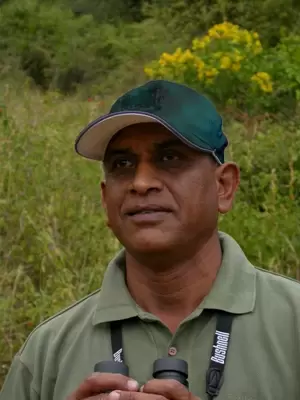Driving home the need for lakes that will help you drive safely on a rainy day

22-December-2011
Vol 2 | Issue 51
His energy revitalises all of us wilting in the noon day sun. And his passion for birds and the environment is palpable in the way he speaks with such drive and enthusiasm, giving up his Sundays to take ordinary citizens around Bangalore’s dying lakes.
This is part of the Whispering Wilderness Programme conducted by the Wildlife Rescue and Rehabilitation Centre (WRRC) Bannerghatta, on the Urban Lakes and Birdlife of Bangalore.
 |
|
Dr Subbu Subramanya creates awareness among fellow citizens on the importance of preserving the remaining water bodies in Bangalore
|
Dr Subbu Subramanya is a scientist working in the Indian Institute of Science, Bangalore, and one of the top ornithologists in the country.
His basic funda is, we need to band together to save what is left of our city’s open spaces. Being a scientist he sees how wrong some decisions taken by our citys administrators are and he takes it upon himself to educate them.
“Bangalore had no natural lakes. In the past our ancestors dammed the streams that flowed in the monsoons so that they could grow two crops instead of just one. They were not stupid like us and respected the lakes, understanding the need to keep them clean and the water fresh.
“It was a dynamic relationship, where the water was used carefully. When the lakes dried out, fresh water flowed in during the next rains through specially created inlets from the catchment areas which were grassy meadows around the lakes.
“Today the meadows are built up and to top it all, untreated sewage is let out by all the posh buildings around the lakes directly into the lake. Therefore what we have now in Bangalore are cesspools of sewage, not fresh water lakes,” says Dr. Subbu with feeling.
Every time it rains, certain areas in Bangalore flood. Dr Subbu says that is because there is no path for the water to pour into the lake or in some places even the lake has been built up.
So taking its natural path the water somehow makes its way and floods the lower floors and basements of these buildings. “Dramatic pictures of floating cars are printed in the next day’s papers and one sees people being ‘rescued’ in life boats by the army,” says Dr Subbu.
Lakes replenish the ground water table and are mandatory requirements in any urban city, explains Dr.Subbu. If we build them up, or abuse them we are sounding our own death knells.
The heavy metals and lead which percolate into the soil of the lake from all the dumped chemical waste or untreated pollutants, and sewage let out into the lake will come back to hit us.
These pollutants percolate into the acquifers that we tap now with our numerous bore wells, he says.
“Isn’t it better to treat our effluents rather than pollute these lakes which are our life line?” asks Dr Subbu, whose only hope is that Bangalore’s citizens will rise up to save the few remaining water bodies from extinction.














